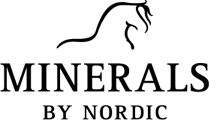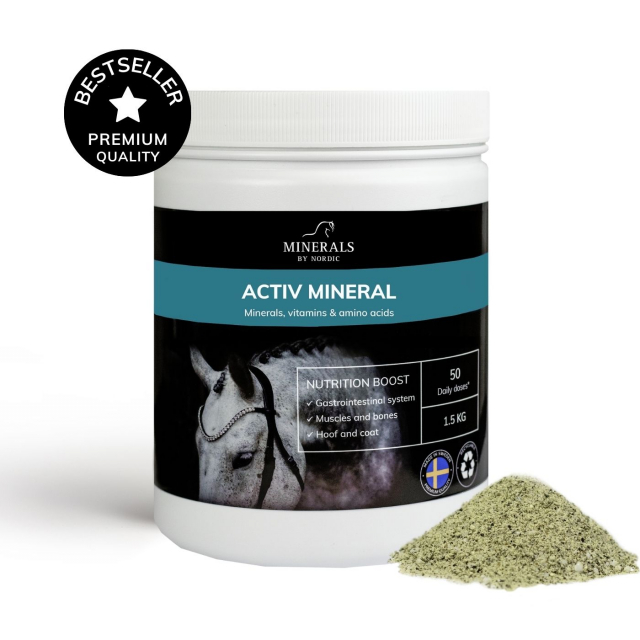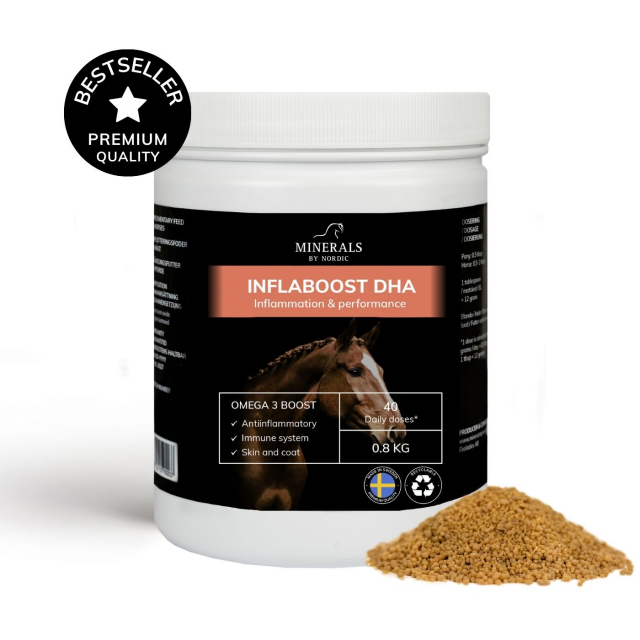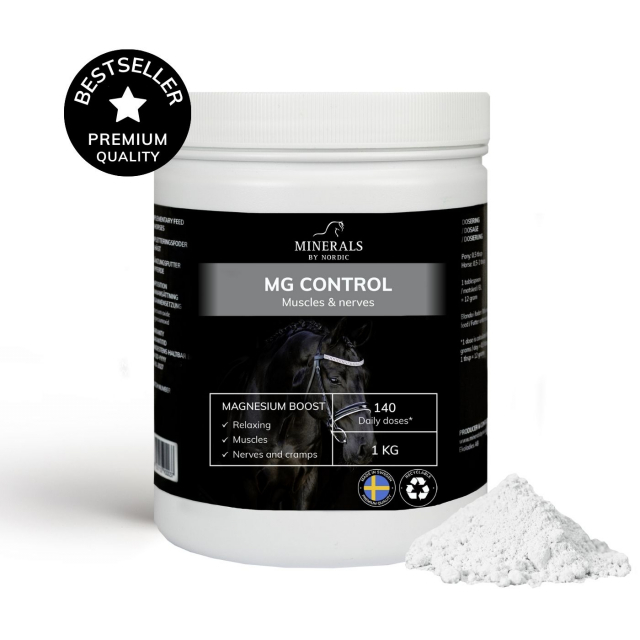
How to build muscle in your horse
Horses are magnificent animals known for their strength, speed, and elegance. Their muscular system plays a crucial role in their ability to perform in various equestrian disciplines. This article explores the horse's muscles and how to enhance their muscle growth and function to maximize performance and well-being.
The horse's muscular system
A horse has approximately 700 muscles. The horse's musculature makes up a significant portion of its body weight and is adapted to provide strength, speed, and endurance, which are crucial for its ability to run and carry weight. The horse's muscular system consists of several major key groups that are important for movement and stability. These include the back muscles, shoulder muscles, lumbar muscles, and hind leg muscles. Each muscle group has specific functions that contribute to the horse's mobility.
Back Muscles: The back muscles support the horse's spine and are important for carrying and keeping the rider balanced. Strong back muscles reduce the risk of injury and improve the horse's posture.
Shoulder Muscles: The shoulder muscles are crucial for the horse's ability to lift and move its front legs.
Lumbar Muscles: Located in the horse's lower back, the lumbar muscles are key to powerful movements. They are particularly important for jumping and quick accelerations.
Hind Leg Muscles: The hind leg muscles provide the horse with the strength and power to jump, run, and support its front end. They are critical for collection and endurance in the gallop.
What is important for enabling muscle growth?
Muscle growth in horses is achieved through the right combination of training, nutrition, and rest. Progressive resistance training, where the horse is gradually subjected to increased workload, is effective for stimulating muscle growth.
Feed & nutrition for building muscle in horses
A balanced diet rich in proteins, vitamins, and minerals is crucial for muscle repair and growth. Supplements can be considered to support the horse's overall nutritional needs.
Protein
Protein is a fundamental building block for muscle growth. It is important to ensure that the horse receives sufficient high-quality protein in its diet. Protein should primarily come from forage, and if necessary, be supplemented with hay pellets, alfalfa, or concentrates to achieve the right balance in the diet. Always ensure the feed is of high quality and free from mold and contaminants, which can negatively affect the horse's health.
Energy
Horses need sufficient energy to support their training and muscle growth. This energy typically comes from carbohydrates and fats in forage and concentrates.
Amino acids
All 20 amino acids are important for building muscles, but the essential amino acids are particularly crucial because the body cannot produce them and they must be supplied through diet or supplements. Leucine, isoleucine, and valine are essential and are considered to contribute to muscle building and recovery, as well as reducing muscle breakdown and soreness. They can also play a role in regulating blood sugar levels and improving training efficiency. Lysine is also a vital building block for proteins and is crucial for the production of carnitine, a substance necessary for the conversion of fatty acids into energy, and for the absorption of calcium. Lysine also contributes to the production of antibodies, hormones, and enzymes, and plays a role in collagen synthesis, which is important for the health of skin, bones, and connective tissue that supports muscles. Activ Mineral contains all 20 amino acids, which are important for muscles and performance.
Fats
Healthy fats like Omega-3 are an important energy source and play a role in cell structure. Omega-3 found in Inflaboost DHA is particularly beneficial.
Vitamins and minerals
Vitamins and minerals such as E and B-complex, and minerals such as selenium, zinc, and copper, are important for muscle function and growth. These nutrients contribute to the horse's overall health and well-being.
Training program for optimal muscle growth
An individualized training program that focuses on gradually increasing intensity and varying exercises is a key to success. Include both cardiovascular and strength training to achieve the best results. Here are some strengthening exercises to incorporate into the training schedule:
Collection work
Proper collection work activates the horse's core muscles, allowing them to lift their back and build muscles in all the major muscle groups sustainably. Transitions and tempo changes are good examples of collection work. The feeling of collection work should be that the horse places more weight on its hind legs. These exercises are beneficial both in the arena and in the forest.
Interval training
Hill interval training is an excellent option for building muscles. The horse automatically needs to activate its hind legs and glutes more than during interval training on flat ground. You also don't need to ride or drive at high speeds to increase both breathing and muscle activity.
Gymnastic jumping
Gymnastic jumping with grid series can be adapted to each horse's capabilities and is beneficial for muscles, agility, and quickness. Longer series with lower obstacles are advantageous for muscle building.
Rest & recovery
Well-balanced rest is necessary to prevent overexertion and injuries. Recovery plays a significant role in the muscle growth process.
Understanding and improving the horse's muscles are crucial for success in riding and training. Through a combination of well-planned training, proper nutrition, and adequate rest, optimal muscle growth and function can be achieved in the horse.
FAQ
How many muscles does a horse have? A horse has approximately 700 muscles. The horse's musculature makes up a significant portion of its body weight and is adapted to provide strength, speed, and endurance, which are crucial for its ability to run and carry weight.
What does a horse need to build muscles? The correct combination of proper nutrition, training, and recovery.
Which supplements can support the horse in muscle building? Prioritize Activ Mineral for minerals, vitamins, and all 20 amino acids. Mg Control for magnesium to avoid stiff and tight muscles. Inflaboost DHA for Omega-3, which is good for circulation, energy, and recovery.

 SWE
SWE


 ENG
ENG NO
NO AX
AX DE
DE